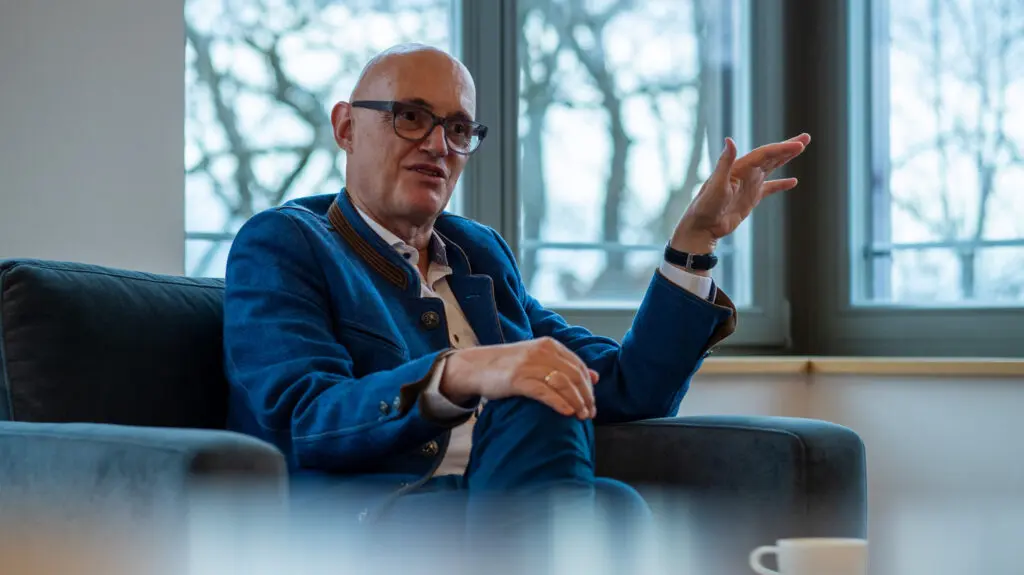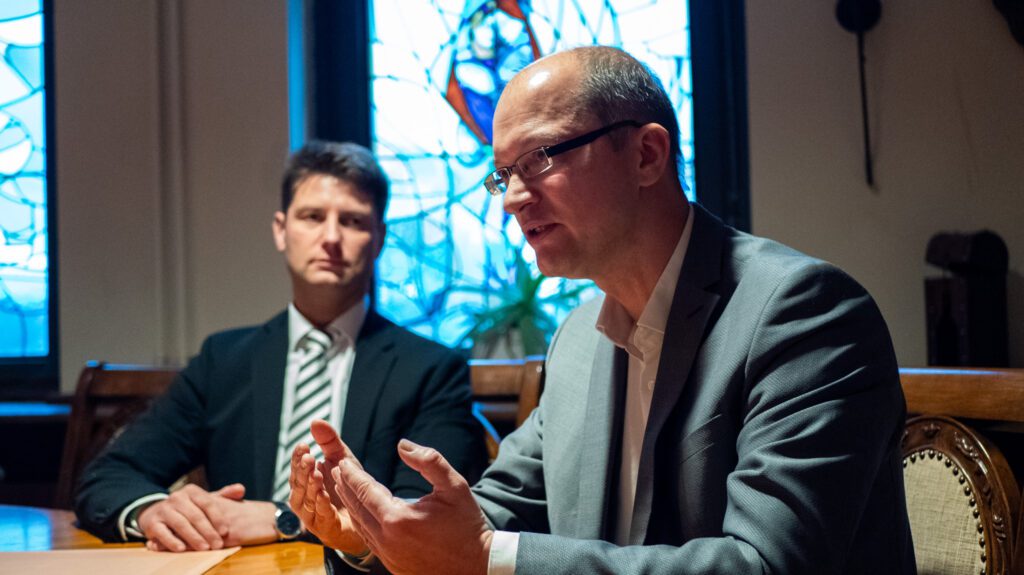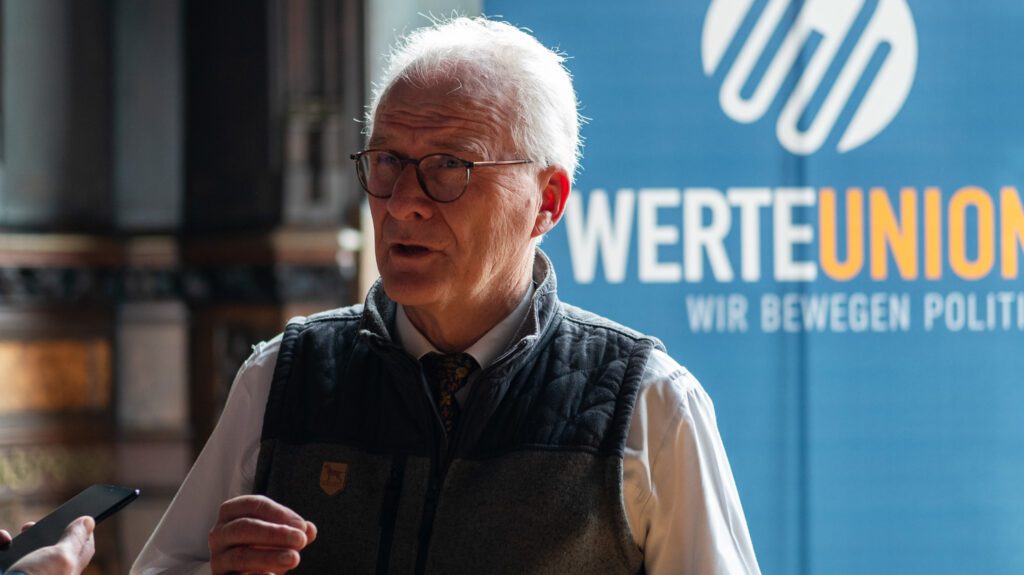ERFURT, GERMANY— Lowering energy costs, reactivating nuclear power plants, decreasing taxes, strengthening borders, speeding up the deportation of illegal migrants, introducing effective policing, more benefits for families, scaling back gender ideology, and pursuing a foreign policy that represents German interests—these are just some of the proposals outlined by Germany’s AfD (Alternative für Deutschland) party, all neatly explained in a pamphlet handed out to us at the party’s Thuringia state conference in the small village of Pfiffelbach.
The plans seem nothing out of the ordinary—they reflect the programme of any average conservative party, not that of an extremist grouping. Yet the AfD has been labelled ‘right-wing extremist’ by the domestic intelligence agency in two German states, Thuringia and Saxony-Anhalt, because its values were said to be “incompatible with human dignity, democracy, and the rule of law.” The other parties of the Bundestag are looking for ways to stop the rise of the party, with a member of the centre-right Christian Democratic Union (CDU) even proposing to ban the AfD outright.
“The strategy to stigmatise the AfD has been going on since the establishment of the party in 2013, but it hasn’t really harmed them. The party’s numbers are higher than ever, so you have to ask yourself whether the steps taken against the AfD are effective,” Hermann Binkert, founder and head of the INSA polling institute, told us on our visit to Thuringia’s capital, Erfurt.

The restrictions of movement and the roll-out of vaccines during COVID, the worsening of the migration crisis, the war in Ukraine, the sanctions against Russia, and the cost-of-living crisis have all contributed to AfD’s rise in the national polls, making it the second-strongest party in Germany. The party made big gains in recent state elections and is planning to send shockwaves throughout the country when it contests the elections in three eastern states, Brandenburg, Saxony, and Thuringia next year. If opinion polls are to be believed, and AfD’s support holds out, it will win all three elections, gaining a third of all votes.
Meanwhile, the three parties that make up the coalition in Berlin—the Social Democrats, the Greens, and the liberal FDP—are losing ground. Together, they received 52% of the votes nationally in the federal elections two years ago; now they are polling at 35% altogether.
“The things they are doing up there in Berlin will lead Germany to fail in every respect. The Americans are forcing us to part ways with Russia, confiscating us of cheap energy imports. We are being governed by idiots, but the people in the western part of Germany have still not awoken to this fact. People here have some common sense left in them,” a middle-aged man told us in Erfurt.
“Crime and migration are issues that AfD takes seriously. They are popular because they understand the worries of the people. The CDU and leftist parties have understood nothing; everything has got worse. That leads to distress and the disenchantment with mainstream parties,” an elderly man says.
The AfD was established ten years ago with the aim of being a party that strongly opposes the bailout of southern European euro zone member states. It made an impact straight away at the 2014 European elections, gaining 7% of the votes. The party went from strength to strength, entering all state parliaments as well as the Bundestag, meanwhile moving from an economy-focused Eurosceptic force to a right-wing national-conservative party. The AfD garnered even more support after the outbreak of the European migration crisis eight years ago, and together with the hard-left Die Linke, they have been able to not just compete, but overtake the mainstream parties in the eastern states. Thuringia is currently governed by Bodo Ramelow of Die Linke, and despite the crisis within the party, it is still on course to get a fifth of the votes in next year’s state elections.
“Though [former] East Germans are generally happy to have reunified with the West, they have different attitudes. They are less attached to the mainstream parties of the West. They are more critical of sanctions against Russia and sending weapons to Ukraine, and also the green agenda. According to surveys, the AfD is the most hated party on a national level. In the east, it is the Greens,” says Hermann Binkert.
Sure enough, the Energiewende policy—the forced transition from fossil fuels and nuclear reactors to green energy—is something the AfD rejects, highlighting its desire to have freedom of choice of energy sources, and also vowing to repair the Nord Stream gas pipelines—that connect Germany with Russia—if it comes to power. The leadership of the party believes that, apart from the topic of migration, their opposition to the climate agenda also plays a role in their sudden rise.

“The policies of the Berlin government are unreasonable. They are planning to ban new fossil heaters. There is already a high tax burden on people, and with economic policies like this, people are starting to realise they have less money to spend. We are the only party that rejects such policies,” Stefan Möller, co-chairman of the AfD’s Thuringia branch, told us at their party conference.
Though the party grows stronger and stronger in the polls, there is still an aversion by the mainstream parties to cooperating with the AfD, which they see as being on the extreme Right of the political spectrum. However, it is mainly here, in the east, in Thuringia, where the centre-right CDU’s local politicians believe that the so-called Brandmauer—the firewall—separating them from the AfD should be torn down. Michael Heym, a CDU member of the state parliament in Thuringia, recently argued that if the AfD gains one-third of the seats in the state parliament, they would be able to block all important votes, where a two-thirds majority is required—thus, parliament will essentially cease to function.
“The Brandmauer should be abolished, because it’s simply bad politics. Why would you not want to speak to a person who is democratically elected, represents more than thirty percent of the voters, and is willing to work for their country? If people are constructive, then let’s speak and work together,” Hans Pistner says. He is the regional leader of the WerteUnion (Values Union), an association in Germany that considers itself to be the conservative wing of the centre-right opposition alliance, CDU/CSU.
Pistner told us that, despite rooting for Friedrich Merz to become party leader and hoping for a shift towards more traditional, conservative values after the “bad decisions” of his predecessor and former Chancellor Angela Merkel, the CDU has not changed. The leadership has even tried to oust the head of the WerteUnion, Hans-Georg Maassen, from the party for his statements on migration. “Merz wants to abolish us, so we are thinking about organising a new party,” Hans Pistner says.

But, as René Aust, a high-ranking Thuringian AfD member running for a seat in the European Parliament at next year’s European elections, told us, “The firewall has already got some holes in it, and after next year’s state elections it could well be that the wall will crumble and fall.” He was referring to the fact that, on the state level, both the CDU and FDP have voted together with the AfD to ban the use of ‘gender language’ and to decrease taxes. “You cannot simply say: You are a member of the AfD, so what you are saying is nonsense,” Uwe Schlammer, a local Die Linke politician in the small town of Sonneberg, recently told public broadcaster MDR about cooperating with the AfD on a communal level.
“We are not just a party, but we are the representatives of an emerging opposition movement,” Stefan Möller says, reiterating the fact that the AfD is polling at 34% in Thuringia, with the second-placed CDU at 22%, and Die Linke at 20%. Hermann Binkert believes that because the CDU tolerates the regional government comprised of Die Linke, the Social Democrats, and the Greens, the AfD benefits from the fact that it is the only real opposition party to the government.
Migration, inflation, and the cost-of-living crisis are also driving the support for the party, especially in the eastern states. “Whether they have real solutions or not, they talk about the problems—migration, Ukraine, COVID—that everyone else is talking about, so it is no wonder they are strengthening,” says a young woman in the town of Suhl, where a lot of people are fed up with the overcrowding of the local centre for asylum seekers.
Hermann Binkert emphasises that the politics of Berlin always impact election results on a state level. This time it will be the Ossis, the eastern Germans, who will have their say. They are visibly annoyed and will hope to make their own impact on German politics.
